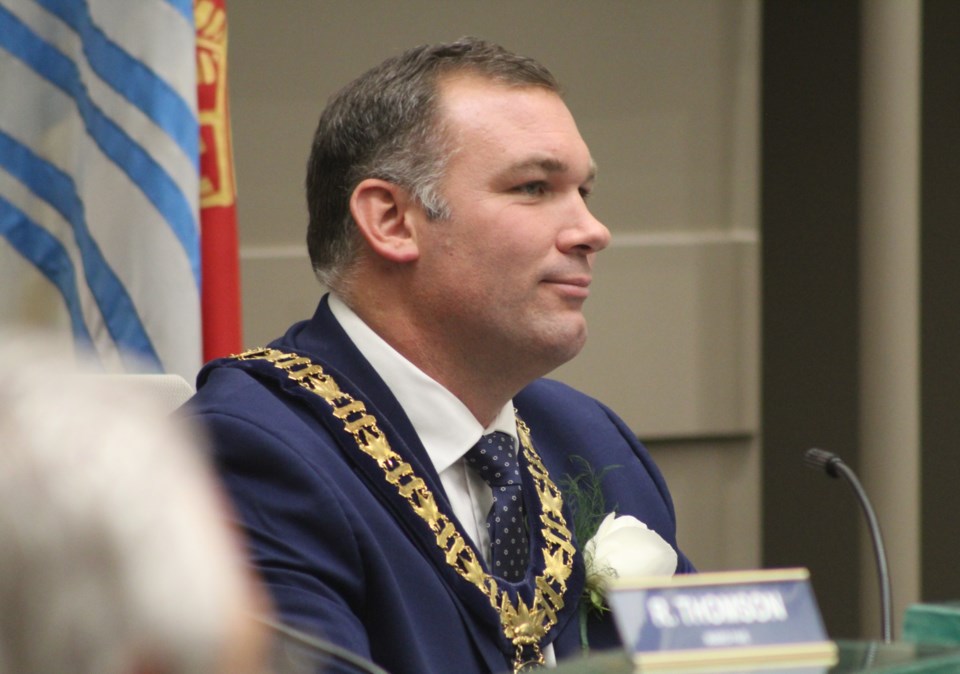City council will consider two direct motions tonight involving strong mayor powers and the upcoming 2024 budget process, which sets both property taxes and service levels in Barrie.
“I do not anticipate employing the strong mayor powers,” said Mayor Alex Nuttall. “However, it is important to note that the budget process has been altered with the introduction of the strong mayor powers by the province.”
Ontario’s Municipal Act provides that a mayor may veto an amendment to the budget passed by a council motion, but council may then override the mayor’s veto if two-thirds of councillors vote to override within 15 days of the mayor’s veto.
But council may pass a resolution to shorten the 15-day override period, and this is the first direct motion: that council shorten the time period to override any veto of the mayor to five days from 15 for the city’s operating, capital and service partner (Barrie police, County of Simcoe, Barrie Public Library, etc.) budgets.
The Municipal Act also provides that council may pass a resolution to shorten the 30-day period to pass amendments to the budget after it is provided by the mayor. Barrie councillors will be receiving the city’s operating and capital budgets on Nov. 15, 2023, followed by the service partner budgets on Jan. 17, 2024.
The second direct motion is that council shorten the 30-day time period to pass such amendments to Barrie’s operating and capital budgets to Dec. 6, 2023, and service partner budgets to Jan. 31, 2024.
“The central question that comes to mind is ‘why?’ said Geoffrey Booth, a retired political sciences teacher at Georgian College. “What is to be gained by shortening the period provided for such review and consideration?”
Coun. Gary Harvey, who is the mover of the motions, said it’s all about timing.
“This motion will bring the timeline for the budget much more in line with the timelines of previous budgets,” he said. “The 30-day clause could and would slow the budget approval process down, whereas the (Municipal) Act does permit councils to shorten the timelines.
“This will keep our approval process much closer to the traditional process and timelines that council has followed for years.”
Nuttall’s answer was similar.
“Our approach to the budget will remain collaborative, like in previous years,” he said. “Council is in the process of streamlining our timelines, mayoral timelines included, for use of the strong mayor powers, with the primary focus of adhering to the council-approved budget and associated timelines.”
BarrieToday also asked Harvey two other questions: “Do you expect the mayor to veto any of these budgets, requiring an override? Do you expect the mayor to provide a budget that may require a shorter than 30 days time period so that council could amend it?”
“Those two questions are hypothetical questions and I don’t have a crystal ball,” Harvey said. “Do I expect any issues? No. This will be a straightforward budget like last year’s budget and all previous budgets during my tenure as councillor.”
Booth said there’s a simpler way to do this.
“Bureaucratic efficiency, whatever that means, appears to be front and centre for this council,” he said. “So be it. I guess I don't understand why it needs to be codified into hard policy.
“This is hypothetical," Booth added, "but what if extra time is required to address something in the future? Do they waive the deadline or change the bylaw back to its former iteration? Why not simply commit to a shorter timeline.”
The Ontario government announced last summer it was expanding so-called 'strong mayor' powers July 1 to the mayors of 26 large and fast-growing municipalities, including Barrie, which have committed to a housing pledge as part of the province’s goal to build 1.5 million homes by 2031.
Strong mayor powers are to offer tools to help heads of council "cut red tape" and speed up the delivery of key shared municipal-provincial priorities, such as housing, transit and infrastructure in their municipalities, the province says.
The powers granted to these mayors include a veto on council decisions conflicting with provincial priorities such as housing, transit and infrastructure — although a two-thirds majority of council can override the mayor’s veto.
These powers also include allowing mayors to propose housing-related bylaws and pass them with the support of one-third of councillors, as well as override council approval of bylaws, such as a zoning bylaw, that would stall home building.
Nuttall said June 16 he was unsure if he would need the strong mayor powers granted to Barrie by the province, but the mayor didn’t disagree with expanding the powers to the mayors of this city.
As things stand now, council members, including Nuttall, are to get their budget binders Nov. 15, with all the operating and capital spending details. At the finance and responsible governance committee meeting Nov. 22, city staff present the budgets.
The budgets then go to general committee Nov. 29 and perhaps beyond, depending upon whether they can be discussed and approved on one night. City council could give the city portion of the 2024 budgets approval Dec. 6.
Service partners make their presentation to councillors on Jan. 31, 2024, then those budgets go to general committee on Feb. 7 and to council one week later.




